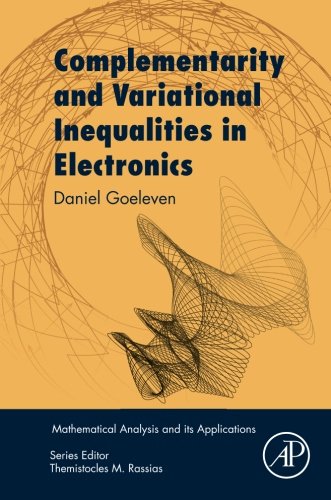

Most ebook files are in PDF format, so you can easily read them using various software such as Foxit Reader or directly on the Google Chrome browser.
Some ebook files are released by publishers in other formats such as .awz, .mobi, .epub, .fb2, etc. You may need to install specific software to read these formats on mobile/PC, such as Calibre.
Please read the tutorial at this link. https://ebooknice.com/page/post?id=faq
We offer FREE conversion to the popular formats you request; however, this may take some time. Therefore, right after payment, please email us, and we will try to provide the service as quickly as possible.
For some exceptional file formats or broken links (if any), please refrain from opening any disputes. Instead, email us first, and we will try to assist within a maximum of 6 hours.
EbookNice Team

Status:
Available4.6
5 reviews
ISBN 10: 0128133899
ISBN 13: 9780128133897
Author: Daniel Goeleven
Complementarity and Variational Inequalities in Electronics evaluates the main mathematical models relevant to the study of electrical network problems involving devices. The book focuses on complementarity problems, variational inequalities and non-regular dynamical systems which are well-known for their applications in mechanics and economics, but rarely target electrical applications. The book uses these tools to review the qualitative properties of devices, including slicers, amplitude selectors, sampling gates, operational amplifiers, and four-diode bridge full-wave rectifiers. Users will find demonstrations on how to compute optimized output signal relevant to potentially superior applications.
In addition, the book describes how to determine the stationary points of dynamical circuits and to determine the corresponding Lyapunov stability and attractivity properties, topics of major importance for further dynamical analysis and control. Hemivariational inequalities are also covered in some depth relevant to application in thyristor devices.
Reviews the main mathematical models applicable to the study of electrical networks involving diodes and transistors
Focuses on theoretical existence and uniqueness of a solution, stability of stationary solutions, and invariance properties
Provides realistic complementarity and variational problems to illustrate theoretical results
Evaluates applications of the theory across many devices, including slicers, amplitude selectors, sampling gates, operational amplifiers, and four-diode bridge full-wave rectifiers
Details both fully developed mathematical proofs and common models used in electronics
Provides a comprehensive literature review, including thousands of relevant references
Chapter 1: The Complementarity Problem
Abstract
1.1. The Complementarity Relation
1.2. The Complementarity Relation in Electronics
1.3. The Complementarity Problem
1.4. The Complementarity Problem in Electronics
Bibliography
Chapter 2: The Convex Subdifferential Relation
Abstract
2.1. The Convex Subdifferential Relation
2.2. The Normal Cone
2.3. The Convex Subdifferential Relation in Electronics
Bibliography
Chapter 3: The Variational Inequality Problem
Abstract
3.1. The Variational Inequality
3.2. The Variational Inequality Model in Electronics
3.3. A General Clipping Circuit
3.4. A Rectifier–Stabilizer Circuit
References
Chapter 4: A Variational Inequality Theory
Abstract
4.1. Recession Tools
4.2. Special Classes of Matrices M and Functions Φ
4.3. A Necessary Condition of Solvability
4.4. A Spectral Condition of Solvability
4.5. A Boundedness Condition
4.6. Positivity and Solvability Conditions
4.7. Nonnegativity and Solvability Conditions
4.8. Existence and Uniqueness Results
4.9. Semicoercivity and Solvability Conditions
4.10. Copositivity and Solvability Conditions
4.11. Diagonal Stability and Solvability Conditions
4.12. General Results in the Nonlinear Case
4.13. A General Framework in Electronics
4.14. Four-Diode Bridge Full-Wave Rectifier
4.15. A Rectifier–Stabilizer Circuit
4.16. A Common Emitter Amplifier Circuit
4.17. Operational Amplifier
Bibliography
Chapter 5: The Nonregular Dynamical System
Abstract
5.1. Kalman–Yakubovich–Popov Lemma
5.2. Existence and Uniqueness Theorem
5.3. Lyapunov Stability of a Stationary Solution
5.4. Invariance Theory
5.5. A Nonregular Circuit with Ideal Diodes
Bibliography
Bibliography
Index
complementarity and variational inequalities in electronics
complementarity and variational problems
complementarity pdf
the complementarity principle
complementarity book
Tags: Daniel Goeleven, Complementarity, Variational